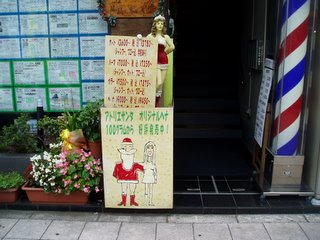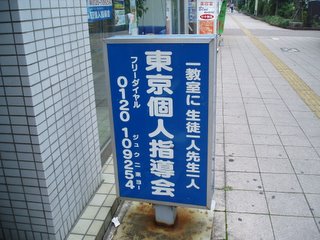
The signs usually have all 3 types of script, Hiragana, Katakana, and Kanji. It is hard to imagine what is being advertised here but this is what we face every day.

I am attempting to learn more Japanese than I did on my first trip. I'm afraid I have to report that my progress is very slow. Perhaps I can indicate to you just what a phenomenal task it is. In the English language we have 26 letters to learn and the combinations of sounds they make. In Japanese there is a Hiragana alphabet that consists of 110 symbols in a curvalinear style. This is their phonetic vocabulary and other than the 5 vowels, the rest of the symbols consist of 2-3 letters each. They also have a Katakana alphabet which is a second phonetic vocabulary and it also consists of 110 symbols, most of which are quite different from the Hiragana alphabet and are made up of straight lines. This alphabet has been designed primarily for foreign names and place names and words of foreign origin. Then there is the Kanji alphabet consisting of Chinese characters each conveying an idea, most of which have at least two readings of meanings. By the way, there are 8000-10000 Kanji characters. Most university students only know 2000 of these and so they even find their own language difficult.
Now, if that isn't enough to tax a foreigner, their number system differs depending upon what you are counting. For example:
the number 1 is "ichi", if you order 1 thing at a restaurant it as "hitotsu", 1 minute is "ippun", 1 week is "isshukan", 1 month is "ikkagetsu". Do you notice a pattern? That's right, THERE IS NONE and this is only a sample of their number system. Some numbers like 4, 7, and 9 have 2 words for each number and I haven't quite figured out when you use each one.
Also the verbs come at the end of the sentence so if you say, "Where is the station?", it is literally translated, "The station where is?"
I have the book, "Japanese For Busy People" and it helps if I have time to dedicate to it. And then there is the matter of proper pronunciation. On Halloween I gave the cleaning ladies, at the university, some candy. They said "thank you" in English and I said "you're welcome" in Japanese. They corrected my pronunciation so you know your pronunciation is bad when the cleaning ladies are correcting you.
My goal this session is to memorize the Hiragana alphabet. So far, I know 30-40 symbols fairly well so I have a long way to go and only 6 weeks left until I return to Canada. Needless to say, I won't be returning fluent in Japanese. Jo and Derek are lucky, Spanish is much easier. Bye for now. Jim

<< Home